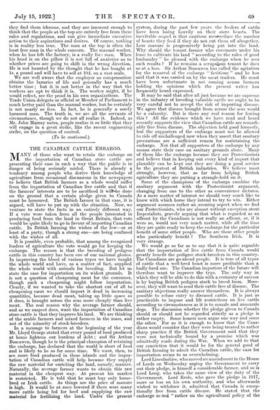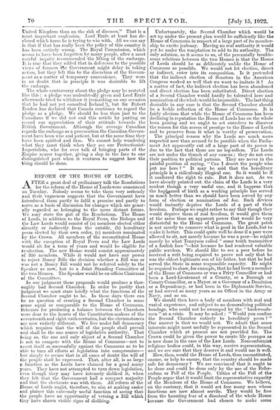THE CANADIAN CATTLE EMBARGO.
MANY of those who want to retain the embargo on the importation of Canadian store cattle are presenting their case in such a way that the public is in danger of being seriously misled. There is already a tendency among people who derive their knowledge of agriculture from occasional discussions in the newspapers to believe that British farmers as a whole would suffer from the importation of Canadian live cattle and that if the farmers' interests are to be sacrificed it willlabe done on the ground that a certain pledge given to Canada must be honoured. The British farmer in that case, it is argued, will have to put up with the situation. Now, we venture to state the facts in an entirely different way. If a vote were taken from all the people interested in producing food from the land in Great Britain, that vote would be quite likely to go in favour of importing Canadian cattle. In British farming the wishes of the few—or at least of a party, though a strong one—are being confused with the wishes of all.
It is possible, even probable, that among the recognized leaders of agriculture the vote would go for keeping the embargo. The reason is that the breeding of pedigree cattle in this country has been one of our national glories. In improving the blood of various types we have taught the whole world and have, as a matter of fact, supplied the whole world with animals for breeding. But let us state the case for importation on its widest grounds. It is not a question of cheapening meat for the consumer, though such a cheapening might follow importation.. Clearly, if we wanted to take the shortest cut of all to cheapening meat we should import it dead in increasing quantities, because dead meat, taking up little space as it does, is brought across the seas more cheaply than live meat. The real reason why the average farmer should, and as we suspect does, want the importation of Canadian store cattle is that they improve his land. We are thinking of the arable farmers and mixed farmers in the mass, and not of the minority of stock-breeders. In a message to farmers at the beginning of the year Mr. Lloyd George stated that every pound of food produced at home lightens our burdens of debt ; and Sir Arthur Boscawen, though he is the principal champion of retaining the embargo, has declared that the world is short of food and is likely to be so for some time. We want, then, to see more food produced in these islands and the impor- tation of Canadian cattle will help because they supply the raw material for enriching the land, namely, manure. Naturally, the average farmer wants to obtain this raw material in the cheapest way. At present his market is restricted. He is told that he must buy only home- bred or Irish cattle. As things are the price of manure is high. It would be at once lowered if there were many more cattle being fed for beef and supplying the raw material for fertilizing the land. Under the present system, during the past few years the feeders of cattle have been losing heavily on their store beasts. The inevitable sequel is that cautious men reduce the number of beasts they feed if they do not cut them off altogether. Less manure is progressively being put into the land. Why should the tenant farmer who covenants under his lease to cultivate his land " according to the rules of good husbandry " be pleased with the embargo when he sees such results ? If he remains a scrupulpus tenant he does so at a loss. Sir Arthur Boscawen has called the agitation for the removal of the embargo " fictitious " and he has said that it was carried on by the meat traders. He must have been unfortunate in not coining across farmers holding the opinions which the present writer has frequently heard expressed.
It may be said that after all just because we are supreme in the industry of breeding valuable cattle we ought to be very careful not to accept the risk of importing disease. We agree that disease brought from across the seas would be a calamity. But is there any real reason for fearing this ? All the evidence which we have read and heard recently supports the view that Canadian cattle are remark- ably free from disease. The objection held good formerly, but the supporters of the embargo must not be allowed to ride off unchallenged now when they assert that sanitary precautions are a sufficient reason for maintaining the embargo. Not that all supporters of the embargo by any means state their case on sanitary grounds. alone. Many of them like the embargo because they are Protectionists and believe that in keeping out every kind of import that plausibly can be kept out they are doing a good service to the greatest of British industries. We believe most strongly, however, that so far from helping British agriculture they are putting a strangle-hold on it. Some of the champions of the embargo combine the sanitary argument with the Protectionist argument, changing from one to the other as convenience dictates. As a mere matter of interest we should very much like to know with which horse they intend to try to win. Either argument assumes rather an amusing aspect when we find our Protectionists, who are almost without exception stout Imperialists, gravely arguing that what is regarded as an affront by the Canadians is not really an affront, or, if it were so, would not very much matter, while all the time they are quite ready to keep the embargo for the particular benefit of some other people. Who are these other people who particularly benefit ? The Southern Irish. It is very strange. We would go so far as to say that it is quite arguable that the importation of live cattle from Canada would greatly benefit the pedigree stock-breeders in this country. The Canadians are go-ahead people. It is true of all types of cattle that a well-bred beast is more profitable than a badly-bred one. The Canadian importers of the future will therefore want to improve the type. The only way in which they will be able to do this with a certainty of success is by buying British pedigree stock to breed from. More- over, they will want to send their cattle free of disease. The sanitary objections really answer themselves. It is always possible to refuse entry to diseased cattle. It is just as practicable to impose and lift restrictions on live cattle according to circumstances as it is to muzzle and unmuzzle dogs. The discussion whether the pledge given to Canada should or should not be regarded strictly as a pledge is rather empty. Some honest men argue one way and some the other. For us it is enough to know that the Cana- dians would consider that they were being treated to rather sharp practice if the British Government said that they were not technically bound by a promise which was admittedly made during the War. When we add to that our conviction that it would be for the general good of British farming to admit the Canadian cattle, the case for importation seems to us overwhelming. Lord Lincolnshire, who moved an amendment in the House of Lords on Wednesday urging the Government to carry out their pledge, is himself a considerable farmer, and so is Lord Long, who takes the same view of the duty of the Government. Lord Ernie, who gave the pledge in 1917, more or less on his own authority, and who afterwards wished to withdraw it, admitted that Canada is excep- tionally free from cattle disease. He stated that the embargo rested " rather on the agricultural policy of the United Kingdom than on the risk of diseases." That is a most important confession. Lord Ernie at least has de- clared which horse he is trying to win with. All we can say is that if that has really been the policy of this country it has been entirely wrong. The Royal Commission, which seems to have been forgotten by many people, after a most careful inquiry recommended the lifting of the embargo. It is true that they added that in deference to the possible views of farmers the Government might delay in taking action, but they left this to the discretion of the Govern- ment as a matter of temporary convenience. They were in no doubt that in principle it was desirable to lift the embargo.
The whole controversy about the pledge may be restated like this : a pledge was undoubtedly given and Lord Ernie afterwards tried to withdraw it (remarking on one occasion that he had not yet consulted Ireland !), but Sir Robert Borden has declared that Canada continues to regard the pledge as a pledge. We should be less than just to the Canadians if we did not end this article by putting on record our appreciation of their attitude towards the British Government. Although the average Canadian regards the embargo as a provocation the Canadian Govern- ment have been wise and patient, but at the same time they have been spirited and firm. We cannot help wondering what they must think when they see our Protectionist- Imperialists, who for ever talk of bringing parts of the Empire nearer together, giving a slap in the face to one distinguished part when it ventures to suggest how the thing should be done.



































 Previous page
Previous page